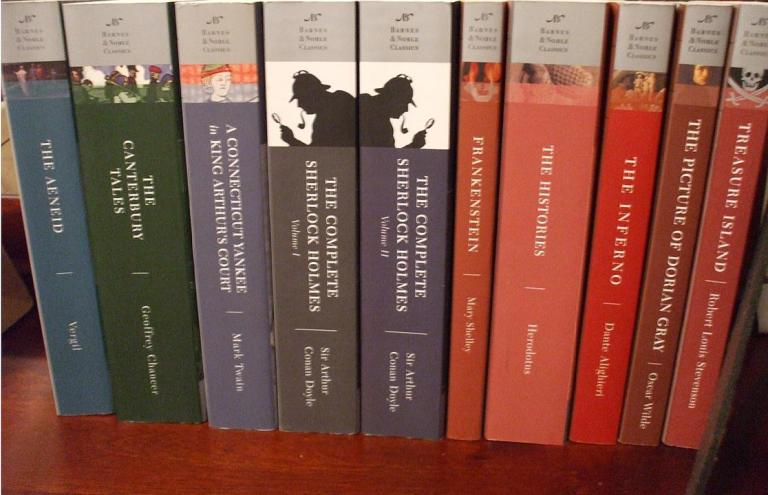February being Black History Month, the publisher Penguin Random House teamed up with a New York Barnes & Noble bookstore to create what they called “Diverse Editions.” These were paperback editions of familiar literary classics, but with covers depicting the main characters as black, with some depicting characters as otherwise non-white ethnicities.
The idea was to honor diversity, to prevent the literary canon from being so white, and to encourage young readers of color to imagine the characters as looking like them.
Alice of Alice in Wonderland, Dorothy in The Wizard of Oz, and Long John Silver in Treasure Island were all given dark skin. So were Peter Pan, Romeo and Juliet, Dr. Jekyll and Mr. Hyde, the Three Musketeers, the Count of Monte Cristo, and Jane Austen’s Emma. The new Moby-Dick kept the white whale, but showed a black Captain Ahab. The monster in Frankenstein was depicted as a black man.
Do you see some problems here? Does this strike you as condescending and patronizing? As if readers of color can’t handle literary history?
African-Americans were deeply offended for other reasons. They pointed out that dressing up white characters to make them look black is little more than “literary blackface.”
Black authors were especially irritated, since Barnes & Nobles, with its best-seller mentality, carries so few books by minority writers.
From Ed Nawotka, B&N, PRH Cancel Diverse Editions Promotion, in Publisher’s Weekly:
Among the critics of the promotion were The Hate U Give author Angie Thomas, who tweeted: “Or / Here’s a thought / Promote books by authors of color. Just a thought.” Author Porochista Khakpour wrote: “Good job you managed to make diversity look racist, a real talent of white America!” And author Eric Jerome Dickey said: “How’s about just putting my novels and novels by other POC up front and on display? We have amazing covers of black people who represent characters that actually appear in our labors of love. Can’t browse what you can’t see and can’t buy what’s not stocked.
At this uproar, Penguin and Barnes & Noble cancelled the Diverse Editions. The companies issued a statement:
“We acknowledge the voices who have expressed concerns about the Diverse Editions project at our Barnes & Noble Fifth Avenue store and have decided to suspend the initiative. Diverse Editions presented new covers of classic books through a series of limited-edition jackets, designed by artists hailing from different ethnicities and backgrounds. The covers are not a substitute for black voices or writers of color, whose work and voices deserve to be heard. The booksellers who championed this initiative did so convinced it would help drive engagement with these classic titles. It was a project inspired by our work with schools and was created in part to raise awareness and discussion during Black History Month, in which Barnes & Noble stores nationally will continue to highlight a wide selection of books to celebrate black history and great literature from writers of color.”
What lessons can be learned from this debacle? Here are a few that come to mind:
(1) It is possible to be so politically correct, so race conscious, that for all of your good intentions, you end up being racist.
(2) Don’t presume to help a group of people by imposing your pre-conceived ideas without asking them what they need.
(3) Don’t be superficial. Be in depth, honest, and real. Zero in on the actual issues.
(4) No matter how liberal and woke you think you are, you can still get cancelled.
What else?
By the way, it’s possible to honor Black History Month with classic literature without lapsing into “literary blackface.” The author of The Three Musketeers and the Count of Monte Cristo, as well as many other French thrillers, was Alexander Dumas, whose grandmother was a black slave from Haiti. Shakespeare’s Othello is about an actual black character and the tragedy of racism. Mark Twain writes perceptively about racial issues. Try the strangely neglected Pudd’n’head Wilson. And there are some fine African-American authors whose works have stood the test of time–being still worth reading after 50 years–and rising to the status of classics: Langston Hughes. James Baldwin. And Ralph Ellison’s Invisible Man (not to be confused with H. G. Well’s The Invisible Man). And don’t fail to read the great African theologian–and one of the greatest theologians of all–St. Augustine of Hippo.
What are some others?
Photo: “Barnes & Noble Classics,” By Steven Veach – I (Steven Veach) created this work entirely by myself., CC BY-SA 3.0, https://en.wikipedia.org/w/index.php?curid=26781710 via Wikimedia Commons.
HT: Paul McCain













